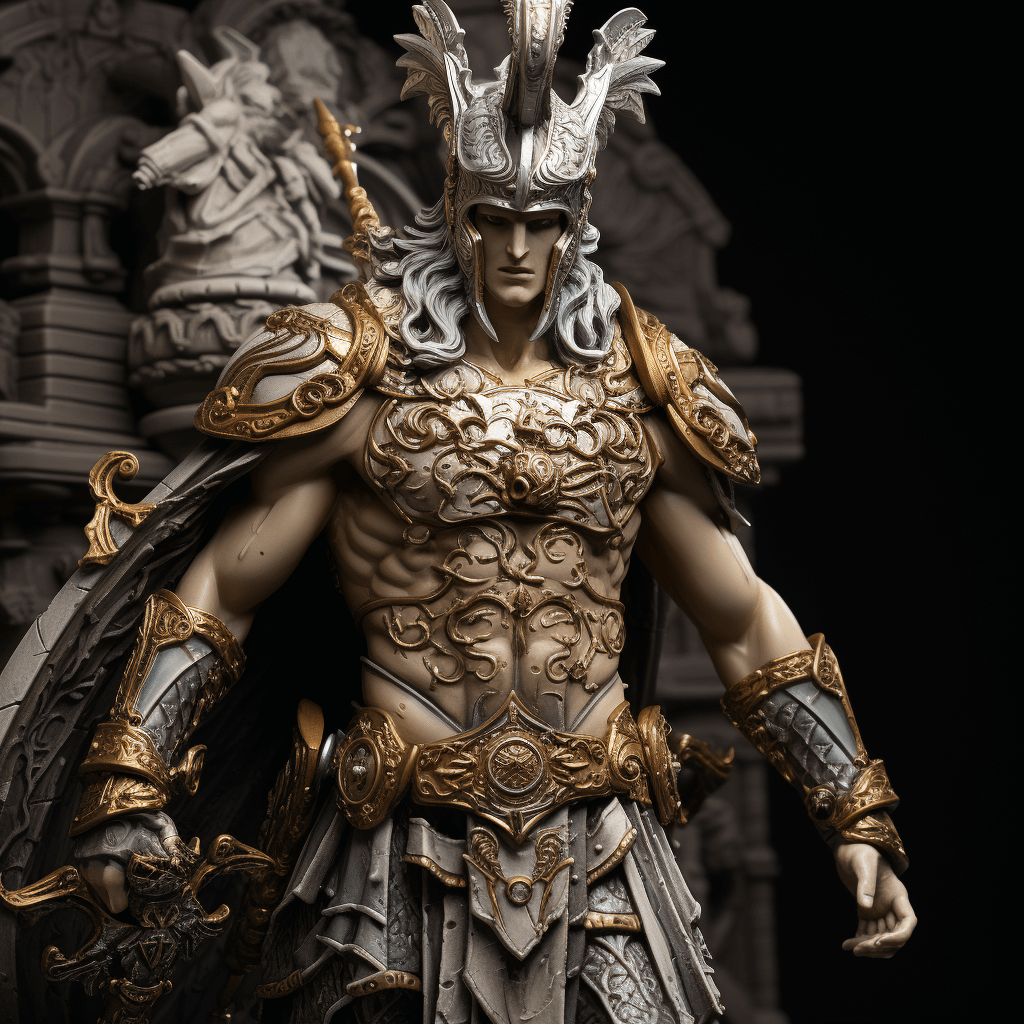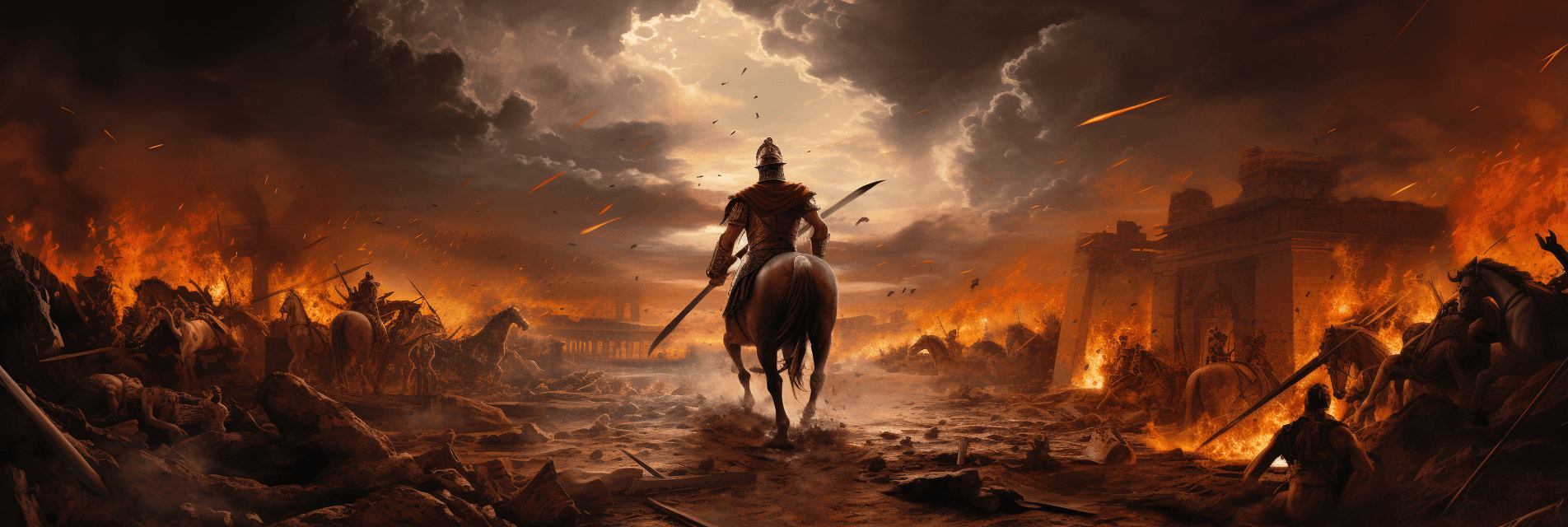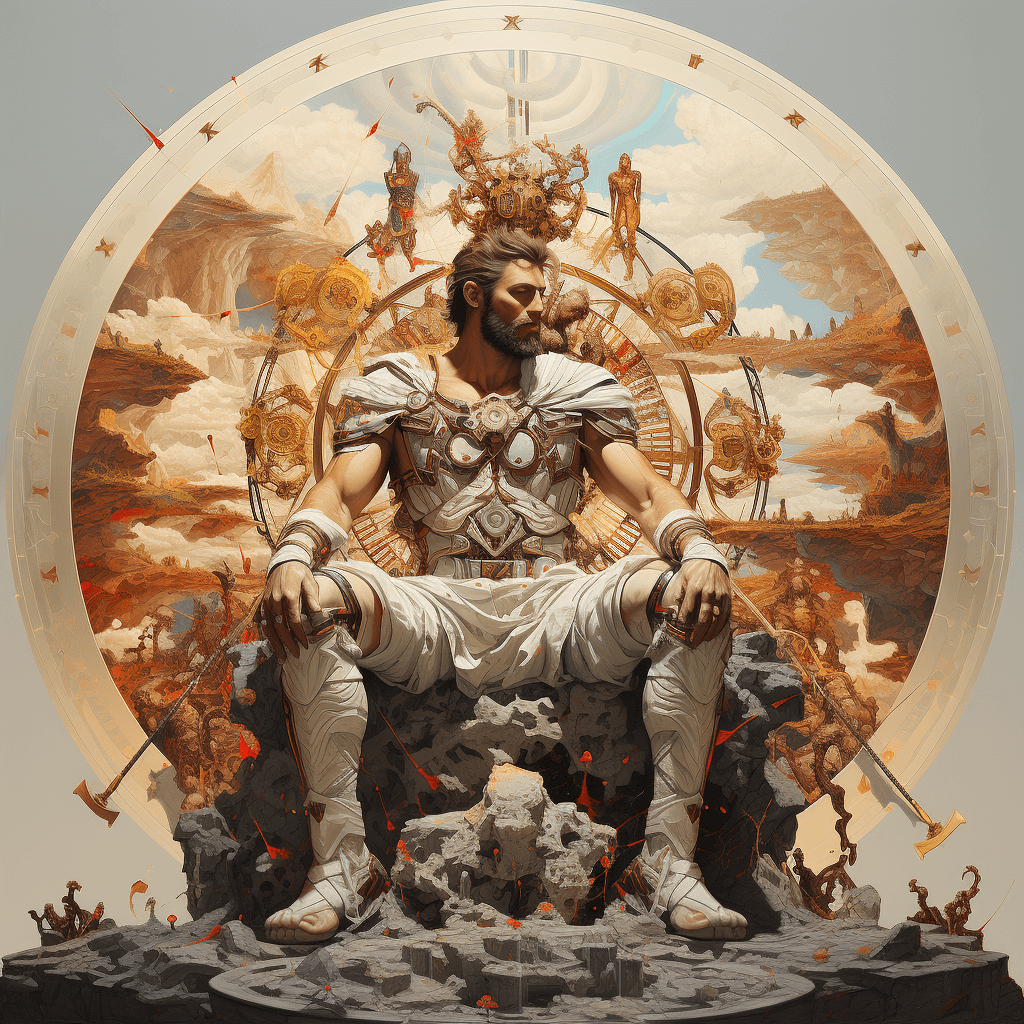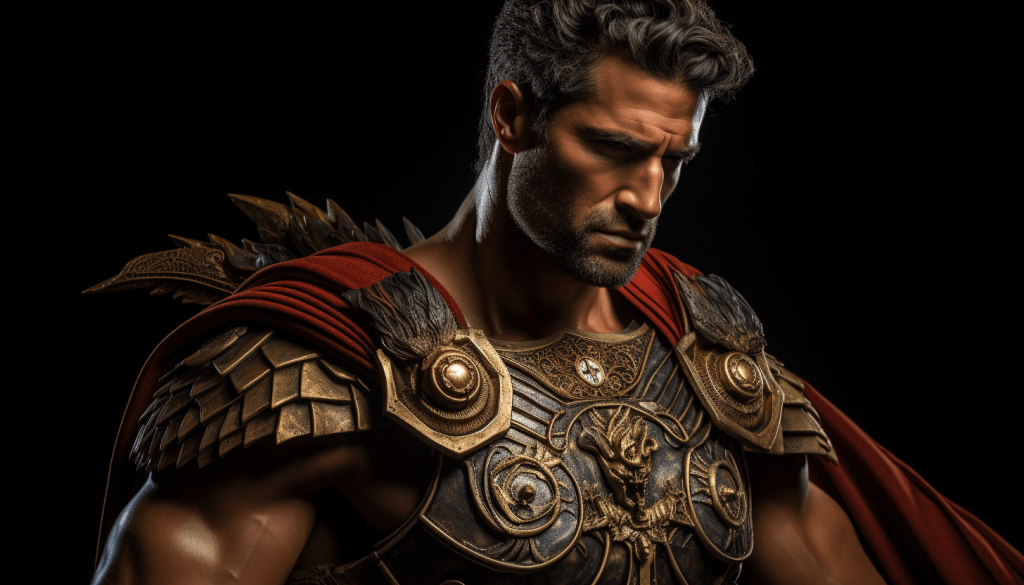Ares: Origins and Evolution from Ancient Greece to the Renaissance
When we think of the pantheon of Greek gods, Ares often stands out as the fierce and formidable God of War. But who was Ares before he became this symbol of battle and strength? Let’s embark on a journey that traces the evolution of Ares from the ancient tales of Greece to the artistic interpretations of the Renaissance.
The Early Myths: Ares in Ancient Greece
The tales of Ares’ origins are as varied as the landscapes of Greece itself. Born to Zeus, the king of gods, and Hera, the queen, Ares was always destined for greatness. In the early myths, he was often portrayed not just as a warrior but also as a lover, a son, and sometimes, a misfit among the gods.

- The Lover: One of the most famous tales is his affair with Aphrodite, the goddess of love. Their union resulted in several children, including Eros, the god of love.
- The Son: As a son, Ares had a tumultuous relationship with his parents, especially with his father, Zeus. Their disagreements often stemmed from Ares’ impulsive nature.
- The Misfit: Unlike Athena, who was revered for her strategic skills in warfare, Ares was often criticized for his brutal and aggressive tactics. This distinction made him a controversial figure among both gods and mortals.
Transition to Rome: Ares becomes Mars
As the influence of Greek culture spread to Rome, so did the tales of its gods and goddesses. Ares was adopted by the Romans and transformed into Mars, the father of Rome. While the essence of the god remained, his image underwent a significant transformation. Mars was not just a god of war; he was a protector of Rome, a symbol of strength and honor.
| Attributes | Ares | Mars |
|---|---|---|
| Symbol | Spear and Helmet | Shield and Lance |
| Role | God of War | Protector of Rome |
| Reputation | Brutal and Impulsive | Honorable and Strong |
The Renaissance: Ares in Art and Literature
The Renaissance, a period of rebirth and rediscovery, saw a resurgence of interest in Greek and Roman myths. Artists and writers sought inspiration from ancient tales, and Ares was no exception. He was often depicted in battle scenes in art, showcasing his might and prowess. In literature, poets and playwrights explored the complexities of his character, presenting him as both a hero and a villain.
From the ancient shores of Greece to the bustling cities of the Renaissance, the tales of Ares have captivated and intrigued. His journey, filled with battles, love affairs, and transformations, is a testament to the enduring power of mythology and its ability to evolve with time.
Ares, the son of Zeus and Hera, stands as the Greek God of War. Celebrated for his bravery, he also embodies the raw chaos of battle. Unlike Athena’s strategic approach to warfare, Ares represents its untamed ferocity, making him a captivating figure in mythology.
The Dual Nature of Ares: Bravery vs. Brutality
At the heart of Greek mythology lies a pantheon of deities, each embodying a spectrum of human traits. Ares, the God of War, is no exception. He embodies both bravery and violence, often depicted with a spear in hand and a helmet atop his head. But what drives this duality? Let’s delve deeper into the contrasting representations of Ares in mythology.
Bravery: The Valiant Warrior
On one hand, Ares is celebrated for his unmatched bravery. He is the god who charges into battle without hesitation, defending Olympus and its inhabitants. His courage is legendary, inspiring warriors and heroes alike. In epic tales, Ares often stands alongside the likes of Hercules and Achilles, fighting against monstrous creatures and formidable foes.
- Defender of Olympus: In numerous tales, Ares is seen as the first to defend the heavenly abode against intruders, showcasing his unwavering loyalty.
- Champion of Heroes: Many a time, Ares has lent his strength and strategy to heroes in need, guiding them to victory.
Brutality: The Ruthless Deity
Yet, for all his bravery, Ares is equally known for his brutality. Unlike Athena, who represents strategic warfare, Ares embodies the chaotic and destructive nature of the battle. His temper is quick to flare, and his methods are often ruthless. This side of Ares has led to many conflicts, both on the battlefield and among the gods.
- Feuds with Athena: Their disagreements are legendary, with Athena often criticizing Ares for his impulsive and brutal tactics.
- Conflict with Poseidon: Ares’ aggressive nature once led him into a fierce battle with Poseidon, the God of the Sea, over a city they both vied to protect.
Striking a Balance
How does one reconcile these two sides of Ares? The answer lies in understanding the complexities of human nature. Just as we possess light and dark, so does Ares. His bravery inspires, while his brutality serves as a cautionary tale. Through his dual nature, Ares reminds us of the thin line between heroism and recklessness, urging us to find our balance.
Ares and Athena: A Tale of Two War Deities
In the vast tapestry of Greek mythology, few relationships are as intriguing as that between Ares and Athena. Both gods of war, yet their approaches to battle and leadership couldn’t be more distinct. Let’s dive into the dynamic between these two powerful Olympians and understand the nuances that set them apart.
The Birthright: Children of Zeus
Both Ares and Athena are offspring of the mighty Zeus. While Ares is the son of Zeus and Hera, Athena’s birth is unique. She sprang fully armored from Zeus’s forehead after he swallowed her pregnant mother, Metis. This shared lineage often brought them together in tales, but their personalities often set them on different paths.
Contrasting War Philosophies
- Ares – The Raw Power: Representing the sheer force and chaos of war, Ares is often depicted as impulsive and fierce. His approach to battle is direct, valuing strength over strategy.
- Athena – The Tactician: Athena, on the other hand, is the goddess of wisdom and strategic warfare. She values intelligence and planning, often outsmarting her enemies rather than overpowering them.
Notable Conflicts and Alliances
Despite their differences, Ares and Athena have found themselves both as allies and adversaries. One of the most notable tales is their involvement in the Trojan War. While Ares supported the Trojans, Athena sided with the Greeks, leading to several clashes on the battlefield.
Shared Respect
Though often at odds, there’s mutual respect between Ares and Athena. They recognize each other’s strengths and have collaborated on several myths to overcome common adversaries. Their dynamic relationship serves as a reminder that even within the realm of war, there are varied philosophies and approaches, each with its own merits.
Ares in Epic Battles: His Role in the Trojan War and Beyond

The annals of Greek mythology are replete with tales of epic battles and legendary warriors. At the forefront of many of these tales stands Ares, the formidable God of War. His involvement in these conflicts, especially the Trojan War, showcases his prowess, allegiances, and the complexities of his character.
The Trojan War: A Battle of Gods and Mortals
The Trojan War, a decade-long conflict between the city of Troy and the Achaeans, is one of the most famous wars in mythology. While mortal heroes like Achilles and Hector took center stage, the gods were not mere spectators. Ares, with his fierce nature, naturally played a pivotal role.
- Supporting the Trojans: Ares, swayed by his love for Aphrodite, who favored Troy, often took to the battlefield in support of the Trojans.
- Clashes with Athena: As mentioned earlier, Athena supported the Greeks. This led to several confrontations between her and Ares, further intensifying the war’s stakes.
Other Mythological Conflicts
Beyond the walls of Troy, Ares was involved in numerous other battles. Whether aiding the giants in their revolt against the Olympians or fighting against the monstrous Typhon, Ares was often in the thick of the action.
- War against the Giants: In the Gigantomachy, Ares stood with the Olympians against the giants, showcasing his loyalty to his divine kin.
- Battle against Typhon: When Typhon threatened the very existence of the gods, Ares joined forces with other deities to quell the monster’s rampage.
Legacy in Battle
Ares’ involvement in these epic battles cements his reputation as a god who thrives in the chaos of war. Yet, it also highlights his complexities. He is not just a god of destruction but also loyalty, passion, and sometimes strategy. Through these tales, we get a glimpse into the multifaceted nature of Ares, making him one of the most intriguing gods in Greek mythology.
Romantic Entanglements of Ares: From Aphrodite to Mortals
While Ares is predominantly known for his martial prowess, his romantic escapades are equally legendary in the annals of Greek mythology. These affairs, ranging from dalliances with goddesses to entanglements with mortals, not only add depth to his character but also intertwine with various myths, adding layers of intrigue and drama.
Aphrodite: A Love Beyond Boundaries
The most renowned of Ares’ love affairs is undoubtedly with Aphrodite, the goddess of love and beauty. Despite Aphrodite marrying Hephaestus, the blacksmith god, her heart was trapped by the passionate and fierce Ares. Their union, though clandestine, resulted in several offspring, including Eros, the god of love, and Harmonia, the goddess of harmony.
Mortal Affairs: Love and Consequences
Ares’ romantic interests were not limited to divine beings. He had several affairs with mortals, each with its own set of tales and consequences.
- Alcippe: Ares’ love for Alcippe, a mortal woman, led to the birth of a daughter. However, when Halirrhothius, a son of Poseidon, violated Alcippe, Ares avenged her by slaying him, leading to a trial in the court of the Olympian gods.
- Rhea Silvia: Another notable affair was with Rhea Silvia, a Vestal Virgin. Their union resulted in the birth of Romulus and Remus, the legendary founders of Rome.
Implications in Myths
The romantic entanglements of Ares often intersected with other myths, adding complexity to the tales. For instance, the affair with Aphrodite wasn’t just a simple love story. It was intertwined with tales of jealousy, subterfuge, and even humor, as showcased in the story where Hephaestus ensnares the illicit lovers in a net as revenge.
Through these tales of love, passion, and drama, we see a different facet of Ares, one that goes beyond the battlefield, revealing a god capable of deep emotions and vulnerabilities.
Sacred Sites of Ares: Temples, Rituals, and Festivals
While tales of Ares’ valor and romantic escapades are well-known, his influence extended beyond myths and into the daily lives of the ancient Greeks. Across the Grecian landscape, there are sacred sites dedicated to the God of War, each echoing tales of his might and offering insights into how the ancients revered him.
Temples: Sanctuaries of Worship
Temples dedicated to Ares were scattered across ancient Greece. These structures, often adorned with statues and reliefs, served as places of worship and reflection.
- The Areopagus: Located in Athens, this rocky hill was not only a place of worship but also a significant judicial site. Legend has it that Ares was tried here by the Olympian gods for the murder of Poseidon’s son.
- Temple in Sparta: In the warrior city of Sparta, Ares had a temple that celebrated his martial prowess. Spartans sought his blessings before embarking on wars.
Rituals: Invoking the God’s Blessings
Rituals played a crucial role in connecting the devotees with Ares. These ceremonies, often accompanied by hymns and offerings, were performed to seek his favor, especially before battles.
- Animal Sacrifices: It was common to offer animals, particularly bulls, to appease the god and seek his blessings for victory in warfare.
- Warrior Dances: In some regions, dances mimicking battle movements were performed as a tribute to Ares, symbolizing the dance of war.
Festivals: Celebrating the God of War
Several festivals were dedicated to Ares, where stories of his courage were narrated, and his blessings sought. These festivals, often marked by feasts and performances, were not just religious events but also social gatherings, strengthening communal bonds.
From grand temples to intricate rituals, the sacred sites and ceremonies dedicated to Ares offer a glimpse into the God of War’s profound impact on ancient Greek society. They stand as testaments to his enduring legacy, far beyond the tales of battles and romances.
Ares in Modern Times: Depictions in Popular Culture

The legacy of Ares, the formidable God of War, transcends ancient myths and continues to influence contemporary culture. From the silver screen to the pages of novels, the modern world has reimagined and reintroduced Ares in various avatars, reflecting society’s evolving perceptions of heroism, conflict, and divinity.
Movies: The Silver Screen Warrior
Modern cinema, with its penchant for epic tales and larger-than-life characters, has often turned to Ares as a source of inspiration. Whether portrayed as the primary antagonist or a complex deity grappling with his nature, Ares’ cinematic depictions are a testament to his enduring appeal.
Literature: Ares Beyond the Myths
In literature, Ares has been explored in depth, with authors delving into his psyche, relationships, and the duality of his character. From fantasy novels to historical fiction, the God of War has been reimagined, humanized, and even satirized.
- Graphic Novels: In the realm of comics and graphic novels, Ares has been depicted as both a foe and ally to superheroes, adding layers to his mythological persona.
- Historical Fiction: Some authors have revisited the ancient tales, offering fresh perspectives and insights into Ares’ role in iconic myths.
Art: The Timeless Muse
Contemporary artists, much like their ancient counterparts, have been captivated by Ares. Through sculptures, paintings, and digital art, they’ve showcased the god in myriad forms, each interpretation reflecting the artist’s unique perspective on war, passion, and divinity.
As we navigate the corridors of modern culture, the omnipresence of Ares is undeniable. His evolution from an ancient deity to a modern icon underscores the timeless allure of mythology and its profound impact on human imagination.
Symbols and Representations of Ares: Decoding Mythological Icons
Every deity in Greek mythology is associated with a set of symbols that encapsulate their essence, power, and domain. Ares, the God of War, is no exception. His symbols, ranging from weapons to animals, provide a deeper insight into his character, influence, and the reverence he commanded among the ancients.
Weapons and Animals: Icons of Ares
| Category | Symbol | Description |
|---|---|---|
| Weapons | Spear | Represents Ares’ direct approach to battle and his unmatched skill in combat. |
| Shield | Symbolizes both defense and attack, highlighting Ares’ dual role as a protector and a destroyer. | |
| Helmet | Indicates Ares’ readiness for war and his role as a leader in battle. | |
| Animals | Vulture | Symbol of death and the aftermath of war, often seen on ancient battlefields. |
| Dog | Represents both loyalty and aggression, encapsulating the dual nature of Ares. |
The Shield and Spear Emblem
One of the most recognizable representations of Ares is the emblem of a shield with a spear crossed over it. This emblem, often engraved on ancient coins or monuments, served as a reminder of Ares’ omnipresence in times of war and peace. It symbolized protection, strength, and the ever-present possibility of conflict.
Decoding the symbols of Ares offers a richer understanding of the god beyond the tales of battles and romances. They serve as a window into the ancient world’s psyche, their fears, aspirations, and the reverence they held for the formidable God of War.
Frequently Asked Questions
Why is Athena the goddess of wisdom?
Athena, according to Greek mythology, sprang fully grown and armored from the forehead of her father, Zeus. As a deity born in such a unique manner, she was deemed the embodiment of her father’s intellect and wisdom. Throughout various myths, Athena’s wisdom manifests in her role as a mentor, strategist, and even peacemaker, making her the epitome of divine knowledge and prudence in the Greek pantheon.
Why does Zeus hate Ares?
Zeus’ disdain for Ares stems from Ares’ impulsive and violent nature, which often contrasts with other Olympian gods’ more strategic and orderly approach. While Zeus recognized the necessity of war, he often disapproved of Ares’ unbridled passion for conflict without reason or strategy.
Who killed Ares?
In most myths, Ares is not depicted as being killed. However, he faced humiliation and defeat on several occasions, notably at the hands of Athena and the mortal hero Diomedes during the Trojan War.
Is Ares and Aries the same?
No, Ares is the Greek god of war, while Aries is one of the twelve signs of the zodiac. However, the name “Aries” is derived from the Latin word for ram, and a ram symbolizes the zodiac sign. The connection between Ares and Aries is that the planet Mars, named after Ares’ Roman counterpart, rules the Aries sign.
Is the god Ares a male or female?
Ares is a male deity in Greek mythology, often depicted as a virile and muscular god representing the raw force of war.
What zodiac sign is associated with Ares?
The zodiac sign Aries is associated with Ares, primarily because Aries is ruled by the planet Mars, which is named after Ares’ Roman counterpart.
Who is Ares in love with?
Ares had several love interests, but his most famous and passionate affair was with Aphrodite, the goddess of love. Their union resulted in several offspring, including Eros (god of love) and Harmonia (goddess of harmony).
Who does Ares fear?
While Ares is a formidable god, he has shown fear or at least respect for certain other deities, especially his sister Athena, who has bested him in combat on several occasions.
What are Ares’ weaknesses?
Ares’ primary weakness is his impulsive nature. Unlike other war deities like Athena, who represents strategy, Ares often acts without thinking, driven by sheer aggression and bloodlust. This impulsiveness has led to his defeat and humiliation in various myths.
How is Ares different from other war gods?
While many gods across different mythologies represent war, Ares uniquely represents the raw violence and chaos of battle. In contrast, deities like Athena represent the strategy and wisdom of warfare. This makes Ares a more volatile and unpredictable god, embodying the inherent unpredictability of war itself.
Discover the Greek Gods and Goddesses
Journey swiftly through the world of Greek gods and goddesses with our guide. Uncover their stories by visiting the links below.

